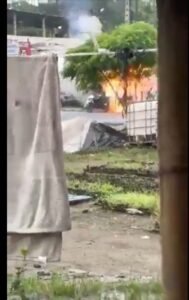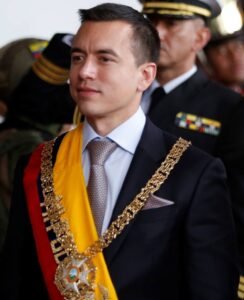Ecuador is facing a crisis as President Daniel Noboa declares a state of emergency on January 8 following the escape of notorious drug lord Jose Adolfo Macias, also known as Fito, from maximum-security detention. The escape has led to widespread unrest in the country’s prisons, prompting the president to announce a 60-day mobilization of soldiers in both the streets and prisons.
Widespread Explosions Heightening the Crisis in Ecuador
Latest reports have shown a wave of explosions rocking multiple cities in Ecuador, creating an atmosphere of fear and chaos. The incidents coincide with escalating violence following the escape of notorious narco boss from prison. The explosions add a new layer of complexity to the unfolding crisis.

Police Officers Kidnapped in Machala and Quito
In the wake of the explosions, reports confirm the kidnapping of at least four police officers in Machala and Quito. The targeting of law enforcement personnel intensifies concerns about the deteriorating security situation in the country.
Law Enforcement Hostages in Multiple Prisons
The crisis deepens as over 50 law enforcement officers are taken hostage in multiple prisons. The situation within the prisons, already in chaos following the drug lord’s escape, has reached a critical point with the abduction of a significant number of officers. The government of President Naboa is expected to take decisive action to curb the crisis, which seems to be getting out of hand.
Fito: Leader of Los Choneros Gang on the Loose
Fito, the 44-year-old leader of the Los Choneros gang is considered extremely dangerous and has instilled fear among his fellow inmates. His escape was discovered during a regular inspection of a prison in the port city of Guayaquil. Authorities believe that Fito managed to flee just hours before the police arrived, and it is suspected that he was informed in advance about the impending inspection.
President Noboa, who took office in November, addressed the nation through a video on Instagram, outlining the measures being taken to address the crisis. In addition to the mobilization of soldiers, a curfew has been imposed from 11 pm to 5 am daily. The president emphasized that the state of emergency provides the armed forces with “all the political and legal support” necessary to combat what he referred to as “narcoterrorists.”

Noboa expressed a firm stance, stating that Ecuador will not negotiate with terrorists and pledged his continuous efforts to restore peace to the country. He described the situation as a battle against criminal elements, particularly highlighting the threat posed by drug-related terrorism.
Challenges Within Ecuador’s Prison System
The escape of Fito has raised concerns about the state of the prison system in Ecuador. The president’s spokesperson, Roberto Izurieta, acknowledged the failure of the prison system and lamented the significant infiltration by criminal groups. The full force of the state is now being deployed to locate the escaped drug lord, with authorities vowing to bring him to justice.
Simultaneously, the prosecutor’s office has launched an investigation into the escape, filing charges against two prison officials suspected of being involved. The level of infiltration by criminal elements into the prison system underscores the challenges faced by Ecuador in dealing with organized crime and highlights the urgent need for reform.

As the country is dealing with the fallout from Fito’s escape, the state of emergency, coupled with the deployment of military forces, reflects the government’s determination to address the immediate security concerns and extract the criminal networks responsible for the unrest in the prisons. The situation remains tense, and the success of these measures will play a crucial role in determining Ecuador’s ability to restore order and peace in the coming days and weeks.










